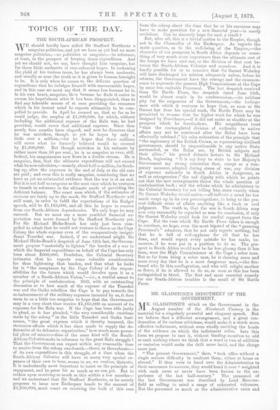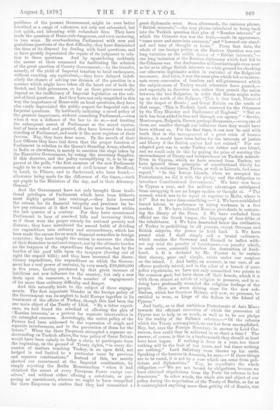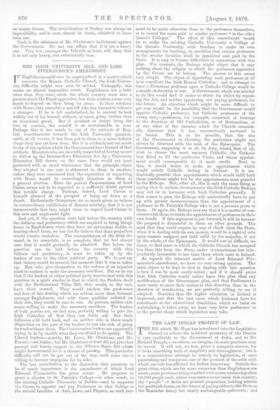MR. GLADSTONE'S INDICTMENT OF THE GOVERNMENT.
MR. GLADSTONE'S attack on the Government in the August number of the Nineteenth Century is the material for a singularly powerful and eloquent speech. But we believe that a different arrangement, and a great con- densation of its various criticisms, would make it a much more effective indictment, without even wholly omitting the heads of the evidence on which the indictment relies. Into this form we propose to cast it, without binding ourselves to add or omit nothing where we think that a word or two of addition or omission would make the drift more lucid, and the charge more just.
" The present Government," then, " took office without a single serious difficulty to confront them, either at home or abroad." If they were to hand over the Administration to their successors to-morrow, they would hand it over " weighted with such cares as never have been known to the ex- perience of the last half-century." The personnel of the last Government was described by Lord Beacons- field as calling to mind a range of exhausted volcanoes. Not the personnel so much as the administrative cares and
problems of the present Government, might be even better described as a range of volcanoes, not only not exhausted, but just quick, and labouring with redundant fires. They have made the question of Home-rule dangerous, and even menacing, in two ways. By overburdening Parliament with new and gratuitous questiOns of the first difficulty, they have diminished the time at its disposal for dealing with local questions, and so have greatly depreciated the repute of its judgment in rela-
tion to these questions. And by squandering recklessly the means at their command for facilitating the solution of the great question of County Government,—by the transfer, namely, of the yield of Imperial taxation to local exchequers, without exacting any equivalent,—they have delayed indefi- nitely the chance of solving one division of the question in a manner which might have taken all the heart out of both the Scotch and Irish grievances, so far as these grievances really depend on the inefficiency of Imperial legislation on the sub- ject of local questions. And they have not only magnified in this way the importance of Home-rule on local questions, they have also vastly depreciated the public respect for Imperial rule on Imperial questions. By habitually initiating a novel policy of the greatest importance, without consulting Parliament,—even when it was a defiance of the law to do so,—and treating the subsequent assent of Parliament as the moral equiva- lent of leave asked and granted, they have lowered the moral standing of Parliament, and made it the mere registrar of their decrees. Nay, they have done more. By the mouth of their Law Officers they have laid down that the proper function of Parliament in relation to the Queen's Standing Army, whether in India or elsewhere, is merely to sanction the steps taken by the Executive Government, by voting the necessary Supplies. If this doctrine, and the policy exemplifying it, is to be ap- proved at the polls, " the first measure of the new Parliament ought to be to vote monuments of civil honour to Strafford, to Laud, to Filmer, and to Sacheverel, who have found,— allowance being made for the difference of the times,—such apt pupils in the Ministers of the day, and in their Attorney- General."
And the Government have not only brought those tradi- tional privileges of Parliament which have been hitherto most highly prized into contempt,—they have lowered the esteem for its financial integrity and prudence far be- low any estimate of it that would have been formed within the last quarter of a century. For they have accustomed Parliament to hear of renewed bills and increasing debts, as if these were the proper remedy for national poverty and distress ; they have introduced the unreal habit of dividing our expenditure into ordinary and extraordinary, which has been made the excuse for so much financial cowardice in foreign countries ; they have taught the nation to measure the claim of their financiers to national respect, not by the ultimate burden on the taxpayer of the expenditure they sanction, but by the burden of the paid bills upon the taxpayer (leaving out of sight the unpaid bills); and they have increased the discre- tionary expenditure, the expenditure on which the Govern- ment has a real power of restraint, by very nearly £10,000,000 in five years, having purchased by that great increase of liabilities not new influence for the country, but only a new drain upon its resources, a fresh number of engagements of far more than ordinary difficulty and danger. And this naturally leads to the subject of these engage- ments. The first important blunder in the foreign policy of the Government was its neglect to hold Europe together in its treatment of the affairs of Turkey, though this had been the one main object of the Treaty of 1856. "By a bitter experi- ence, we had found the mischief of allowing the plea of 'Russian interests,' as a pretext for separate intervention in its entangled concerns. Accordingly, the entire policy of the Powers had been addressed to the repression of single and separate interferences, and to the prevention of them for the future." When the three Emperors attempted a separate un- derstanding on Turkish affairs, the true policy of Great Britain would have been calmly to lodge a claim to participate from the beginning, on the ground of Treaty rights, " in every dis- cussion of matters touching Turkey, in an open field, not hedged in and limited to a particular issue by previous and separate combinations." Instead of this, we merely showed our resentment at the Imperial combination, by simply rejecting the Berlin Memorandum " when it had obtained the assent of every European Power except our- selves," and without either offering a substitute, or pro- posing an amendment, whereas we ought to have compelled the three Emperors to confess that they had committed a
great diplomatic error. Soon afterwards, the ominous phrase, " British interests,"—the very phrase calculated to bring back into the Turkish question that plea of "Russian interests" of which the Crimean war was the fruit,—made its appearance, "came more and more into currency," and "lowered our stand- ard and tone of thought at home." From that date, the
whole of our foreign policy on the Eastern Question was one long variation on the selfish theme of " British interests,"—
one long imitation of the Russian diplomacy which had led to the Crimean war. Our Ambassador at Constantinople even went so far as to allege British interests as a fair ground for checking our otherwise legitimate action in restraint of the Bulgarian massacres. And later, it was the same plea which led us to atten- uate every concession of freedom and self-government which
the subject-races of Turkey would otherwise have gained,—
and especially to threaten war, rather than permit the union between the two Bulgarias, in order that Russia might write up on the north of the Balkans, This is free land, liberated by the despot of Russia ;' and Great Britain on the south of that range, This is Turkish land, reserved for the Ottomans
by the Tory Ministry and Parliament of England.' "Not an inch has been added to free soil through our agency." " Servia, Montenegro, Bulgaria, Greece, perhaps Roumania,—every one of them are smaller through our influence than they would have been without us. For the first time, it can now be said with truth that in the management of a great crisis of human destiny, it would have been better for the interests of justice and liberty if the British nation had not existed." For our adopted part was to make Turkey our debtor and our friend, and we could only do this by paying the price of resisting the encroachment of liberty and independence on Turkish misrule. Even in Cyprus, which we have rescued from Turkey, we have ignored those principles of constitutional liberty for " which in ordinary times, Tories, as well as Liberals, feel some regard." " In the Ionian Islands, when we accepted the Protectorate, we did it with the pledge and the obligation to introduce Constitutional Government." We have now been in Cyprus a year, and the military advantages anticipated from occupying it are no longer spoken or thought of. " The arsenal, which was to be equal or superior to Malta, where is it V" But we have done something :—" 1. We have established forced labour, in preference to hiring workmen in a free market. 2. We have followed Russian precedents in restrain- ing the liberty of the Press. 3. We have excluded from official use the Greek tongue, the language of four-fifths of the inhabitants. 4. We have descended below the civilisation of Turkey in prohibiting to all persons, except Ottoman and, British subjects, the power to hold land. 5. We have- passed what I shall simply call a brutal ordinance, which enables the Governor and Council to inflict with-. out any trial the penalty of banishment,—a penalty which,. in such cases, commonly involves the destruction of liveli- hood. G. It is declared by Mr. Forster to be certain. that slavery, pure and simple, exists under our auspices on the island. 7. And lastly, on account, in one case, of an offence perfectly trivial, and in the other of a breach of mere- police regulations, we have not only committed two priests to the common gaol, but have shorn off their beards, which it is with them almost an article of religion to preserve, and in so doing have profoundly wounded the religious feelings of the people. Here are seven shining stars for the new sub- diadem, which her Gracious Majesty will now, we presume, be entitled to wear, as Liege of the Sultan in the Island of Cyprus."
And lastly, as to that ambitious Protectorate of Asia Minor towards the efficient execution of which the possession of Cyprus was to help us so much, as well as to be our pledge for the reality of the Sultan's reforms,—" Of the reforms contemplated, no one has been accomplished. which the Treaty
Nay, but, says the Foreign Secretary, in answer to Lord Car- narvon, how could they be achieved in so short a time V The answer, of course, is that in a twelvemonth they should at least have been begun. If nothing is done in a year, ten times nothing will be the fruit of ten years, and ten times nothing are nothing." Lord Salisbury even throws up his cards. Speaking of the horrors in Armenia, he says,—" If these things are to be cured, it is not by a cure which can come from poli- ticians and diplomatists." Nay, he repudiates the whole obligation :—" We arc not bound by obligations, because we have obtained stipulations from the Porte for reforms in her dominions." In other words, the whole aim and object of our policy during the negotiation of the Treaty of Berlin, so far as it contemplated anything more than getting rid of Russia, was
an empty dream. The revivification of Turkey was always an impossibility, and is now, almost in terms, admitted to have been one.
Such is the substance of Mr. Gladstone's indictment against the Government. No one can affirm that it is not a heavy one. Very few, amongst the Liberals at least, will deny that it is not only heavy, but substantially true.




































 Previous page
Previous page